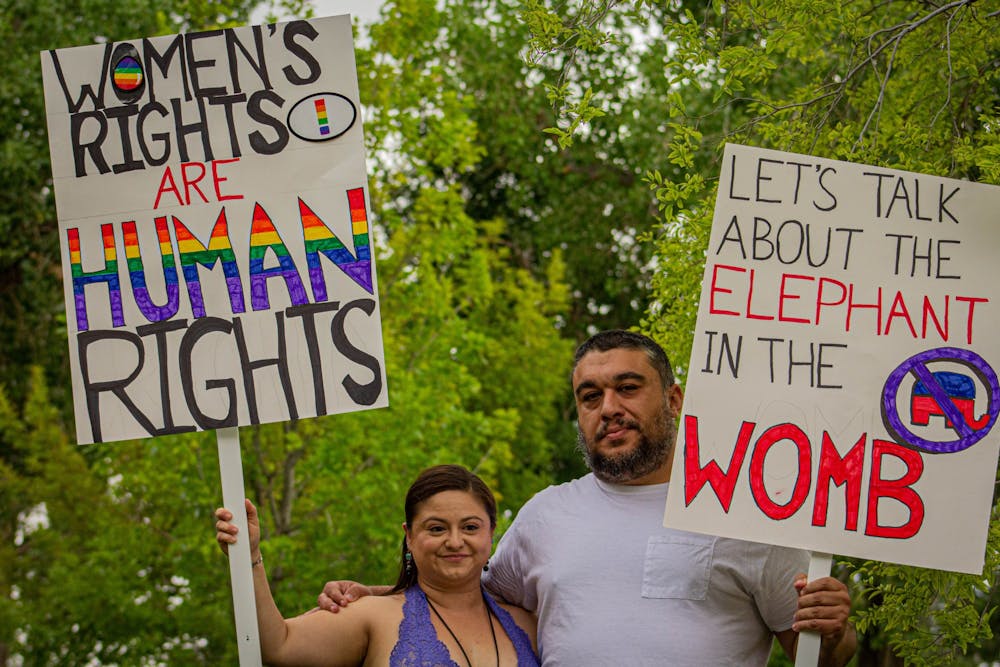On June 24, the Supreme Court ruling in the case of Dobbs v. Jackson Women's Health Organization overturned the legal precedent of Roe v. Wade and Planned Parenthood v. Casey, which guaranteed constitutional protection of abortion rights. Due to the highly divisive nature of this decision, journalists across the country are struggling to balance their personal opinions with journalistic neutrality.
Rebecca Salinas, a digital journalist for KSAT in San Antonio, believes in neutrality and understands its importance in journalism, but also sees an importance in bringing emotion to a piece while staying on the line of impartiality.
“We are human, although we are journalists … It’s hard not to bring emotion into it … It's important to bring (that) human aspect to your reporting. (It) goes a long way. For example, just reporting on diversity. Obviously, it's wrong to judge or hate someone depending on the color of their skin. There's no counterpart to that — there shouldn't be a counterpart to that. As far as abortion and gun rights, you can see two parts to that story,” Salinas said.
Showing multiple sides when covering topics like reproductive rights is a skill, according to Annette Nevins, award-winning reporter and adjunct journalism professor at the University of North Texas and adjunct lecturer at Southern Methodist University.
“You can go overboard (when) trying to be too balanced … If you're going to go to a big protest where most of the people there are pro-choice, and then you’re going to be having a lot of people there for pro-life … You want to have some (pro-life sources), but you don't want to go over. The story there is the pro-choice rally,” Nevins said.
Michael Marcotte, a reporter and journalism professor at the University of New Mexico, has what he calls an “old school” view of journalism and impartiality.
“Journalism has served the country very well by trying to be fair, trying to be impartial, (and) trying to understand the different values that are at work in a pluralistic society like we have … Everybody's got a perception: you're either with us, or you ain’t. But if you maintain your detachment and you're professional, neutrality is a position to take. You can be trained to be fair. We have (a) methodology that assures … proper vetting and accuracy,” Marcotte said.
Ismael Perez, a columnist, opinion writer and member of the Chicago Sun-Times editorial board, reflected on how impartiality in news reporting could affect a journalist's mental health.
“You can’t just go home and forget about what you've covered ... I covered a public suicide, and it affected me for like six months … I saw parents crying. I saw the neighborhood grieve … (You can) be neutral when you go to a city government meeting, and they're talking about some proposal that they're gonna pass. But when it comes to like racism, abortion, social injustice, racial injustice — you're gonna have to reflect on what you've covered that day, and you just can't let it go after you write that story,” Perez said.
The pressure to not voice one’s opinion through protest and political action can similarly impact a reporter’s mental health.
“We have our own opinions and our own biases, and I don't really think it's fair that just because we are journalists, we can't participate in certain protests or demonstrations,” Salinas said. “Because we do want to speak up for ourselves and our rights … If you're not reporting and you're not wearing gear that identifies you as a journalist, then I believe that should be okay.”
Even beyond protests and political action, some media holdings like Gannett have directly forbidden their journalists from sharing comments on social media regarding their political opinions.
Get content from The Daily Lobo delivered to your inbox
“I'm pretty open (to) people (having) their own opinions or saying them out loud. But there should be some kind of knowledge within yourself whether like, oh, I think I've gone too far or not,” Perez said. “I feel like readers understand that you are going to have a side … If you're gonna post something, you need to filter it within yourself.”
Marcotte believes a journalist can have strong opinions and still publish work worth merit; however, he acknowledges that audiences might not see it the same way.
“People are quick to act on their perceptions … I do think it's a natural human tendency to say, ‘Oh, look what she's saying on her Twitter feed, how can I read her journalism and think it's not highly uninformed?’ It's just a natural tendency,” Marcotte said.
Other journalists like Perez think reporting goes beyond finding relevant sources and stretches to finding the right reporters for an article — reporters who might have personal experience relevant to the article that could make it better.
“I think personal experience on a subject matter might help a journalist, the reporting process and what people want to know about … (Being) neutral has been a big part of what is required of a journalist for eons. But there is some strength to bringing your personal experience to a story. And that doesn't mean it's going to be impartial — that might just mean that you'll get to the point or the heart of the story better,” Perez said.
Elizabeth Secor is a freelance reporter for the Daily Lobo. She can be contacted at news@dailylobo.com or on Twitter @esecor2003
Elizabeth Secor is a freelance reporter for the Daily Lobo. She can be contacted on Twitter @esecor2003






